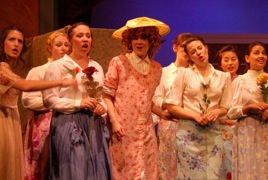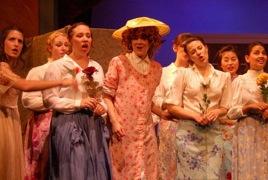How do you get to be a successful opera singer? According to Sylvia Anderson, founder of the Bay Area Summer Opera Theater Institute (BASOTI), it takes a combination of talent, vocal and acting techniques, time and experience, confidence, honesty, and — most of all — the passion to want it “with all of your heart.” Anderson, herself a celebrated opera singer, founded BASOTI 18 years ago because she felt that young singers emerging from universities and conservatories were often lacking in sufficient live performance experience to enable them to be comfortable with and successful in auditions for professional opera companies. Today, BASOTI’s summer opera training program hosts close to 80 singers in an intensive six-week-long, performance-oriented experience that, Anderson says, “lifts each singer to their next level.”

A typical day at BASOTI is 12 hours long, in which singers focus primarily on the staging and acting of three full-length operas, as well as close to 50 opera scenes. The institute culminates in public performances of the three opera productions: This year the operaschisen by Artistic Director Yefim Maizel are Cavalli’s La Calisto (July 15-18), Puccini’s Suor Angelica (July 21-24), and Mozart’s Die Zauberflöte (July 22-Aug. 1). All three operas will be fully staged and costumed by Maizel Using full staging and costumes is an important part of BASOTI’s training, as it is one element that young students may not have had the chance to experience in their college or university studies. A costume, just like staging and acting, gives a singer one more thing to think about while on stage, and Anderson points out that singers need practice balancing the vocal technique that they’ve learned with these extra elements that are vital to a finished, professional opera performance.
Two of this year's operas, La Calisto and Die Zauberflöte, will be presented with a full orchestra (Suor Angelica, a one-act, will have a two-piano accompaniment). For some singers, these productions may be their first experience singing on a stage with an orchestra in the pit — a very different task from singing with a piano. The BASOTI orchestra, too, is largely made up of students or recent alumni of music conservatories, including the San Francisco Conservatory of Music. Some of these players, Anderson says, may never have played in an opera orchestra before. Thus, many performers gain their first experience working to blend the vocal, stage, and instrumental elements into one performance.
In the final weeks of the program, BASOTI’s students will offer opera scene performances (July 2-10) plus an aria evening (July 26), and will sing in several master classes — all open to the public. Anderson finds that many nonperforming opera lovers are fascinated by the master classes in particular. They enable opera-goers to enter into the “inner world of opera: how we think about our instrument, and how we present our craft on the stage.” This year’s master classes feature such renowned singers and teachers as Anderson herself (June 26), Patricia Racette (June 28), Patricia Wise (June 30), Jane Randolph (July 17), Patricia Craig (July 28), and David Bender (July 31), and, new this year, staging director Yefim Maizel (July 7).
Most events take place at the S.F. Conservatory of Music and at St. Monica’s Catholic Church, but Die Zauberflöte will be presented at Fort Mason’s North Side Theater, which has a three-sided thrust stage. For the singers, this means the audience will be nearly surrounding them, a much more intimate relationship than they would find in large, professional opera houses. For the audience, BASOTI’s wide range of performances provides a close view of the opera world, as well as a chance to encourage several promising young singers to continue reaching for their dream.

